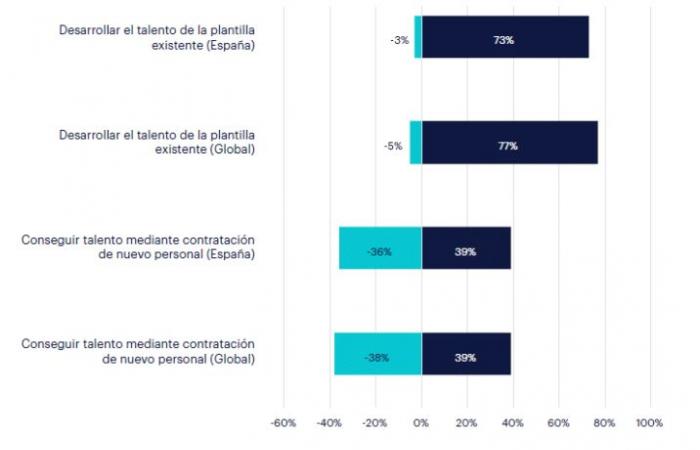Search for talent en casa. This is the solution that companies are betting on in the face of the growing trend of shortage of professionals, especially specialized ones, in the labor market. Thus, three out of every four companies (73%) in Spain trust in developing the current talent of their workforce to maintain the proper functioning of the activity, according to the Training Trends Report, prepared by Randstad Research.
This percentage practically doubles the 39% of companies that hope to find talent by hiring new personnel. «The profound demographic, technological, environmental, social and labor changes lead to a shortage of professionals that forces companies to develop internal talent to ensure the optimal functioning of their activity.«says Rita González, director of Randstad Learning, the training division of the Randstad group in Spain. «Given this, it will be necessary to promote the updating and continuous training of employees, a demand that, on the other hand, they already prioritize when evaluating a job offer.«.
Training, a growing need
The vast majority of workers will need some type of basic training to adapt to technological or environmental changes, as well as to assimilate a work culture in more flexible, diverse and inclusive organizations. Only a minority will need a deeper and more extensive upgrade to adapt to new specialized tasks or master the use of complex innovative tools. The report states that six out of ten workers will need training until 2027, but almost half (44%) of those who need this update will not be able to access it, basically because it will not be available.
The importance of training and updating skills is becoming increasingly important in the current labor market. In the last 15 years, the Spanish economy has created 2.5 million jobs with a high educational level and has destroyed 2.8 million jobs with a low educational level, following the trend of OECD countries. Between 2023 and 2035 it is expected that two out of every three (67%) jobs will require a high level of education, compared to 29% that will require a medium level and only 4% a low level.
In fact, the unemployment rate in Spain for young people (25 to 29 years old) with a low educational level is much higher than that of young people with a high educational level.
What profiles are going to need training?
Although all professionals will need training, there are three groups whose needs will be greater:
- Jobs linked to the digital and environmental transition, whose employees need training in technological fields, such as AI, robotics, immersive reality or green jobs, as well as hybrid specialists (experts in finance or law and artificial intelligence).
- Jobs related to changes in consumption patterns and generational replacementwith the need to train new professionals in fields such as health, care or others.
- Obsolete jobs due to the digital and environmental transition, whose professionals need recycling to access new professions.
The objective of the European Union is that By 2030, at least 60% of adults receive training every year. In fact, the EU’s European Recovery and Resilience Mechanism has 64.8 billion euros for these purposes. 45% of European companies consider public financing key to increasing training, considering it the most important policy among all those developed by the public administration.
Innovation and new technologies will also help its implementation. The use of virtual reality in education will allow for more realistic and interactive training, reducing risks during the learning experience and in the workplace, and saving costs.
«The talent shortage has caused many companies to put learning at the center, more strongly than ever. Faced with this demand, at Randstad Learning we are testing new creation tools, producing customized content, expanding alliances with technological content partners, but above all supporting our clients to make training happen. We help them ensure that completion, satisfaction and applicability are reflected in their results,” concludes Rita González.



